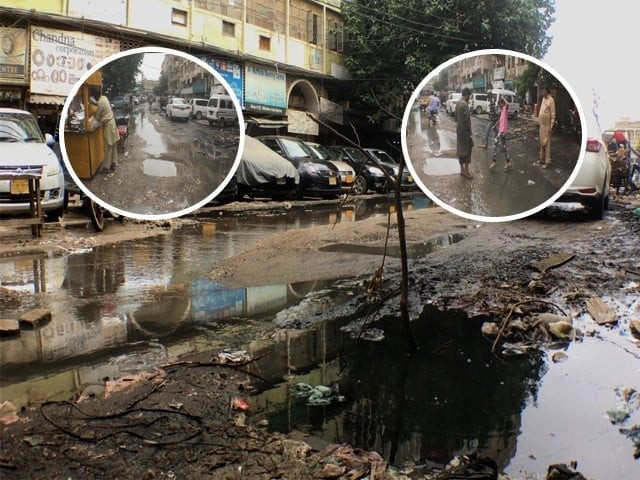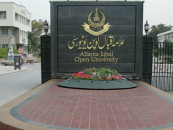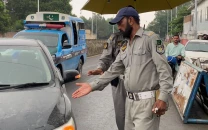Sindh govt urged to address Karachi's infrastructure
Businessmen say dilapidated roads, sewerage issues, traffic jams threaten city's markets, economy

Business leaders in Karachi have urged Sindh Chief Minister Syed Murad Ali Shah and Karachi Mayor Murtaza Wahab to urgently address the city's deteriorating infrastructure.
They called for the immediate repair of roads in key markets and the fixing of the collapsed sewerage system, which they say are causing severe traffic congestion and hurting local businesses.
Speaking to The Express Tribune, these leaders highlighted how poor road conditions, exacerbated by a failing sewer system, are leading to environmental pollution and deterring shoppers from visiting markets.
The recent monsoon rains have only worsened the situation, washing away many roads and squares across the city. According to them, only 5% of Karachi's roads meet high standards, while the majority are in terrible shape.
"Karachi's citizens are suffering, despite paying the highest taxes in the country.
The city, which contributes over 65% of national revenue and 95% to the provincial exchequer, remains neglected," said one business leader.
They described commuting in Karachi as a "matter of life and death," as frequent traffic jams leave commuters frustrated, often leading them to violate traffic rules. This, in turn, causes accidents and exacerbates the city's traffic problems.
Chairman of All Karachi Tajir Ittehad, Atiq Mir, called for a forensic audit of the city's road and sewer systems, urging the Pakistan Army and judiciary to punish corrupt contractors and officials responsible for the current mess.
"More than 50% of development funds are pocketed by political parties in collusion with contractors," he alleged, adding that Karachiites are paying billions in extra fuel costs due to the constant traffic jams. Mir also lamented that giving funds to the Sindh government was a "dead loss" due to rampant corruption and mismanagement. He stressed the urgent need for accountability to restore the city's infrastructure.
Asif Gulfam, Chairman of the Alliance of Arambagh Market Association, reiterated the need for a master plan that prioritises fixing sewerage lines before road construction.
He also criticised the Karachi Water and Sewerage Corporation (KWSC) for its failure to provide reliable water and sewerage services in the country's economic hub.
Gulfam urged the government to introduce a proper system of checks and balances to ensure infrastructure development benefits traders, businesses, and the general public.
Acting President of the Karachi Chamber of Commerce and Industry (KCCI), Altaf A Ghaffar, echoed these concerns in a statement. He made a passionate appeal to Chief Minister Shah and Mayor Wahab to take immediate, concrete steps to fix the city's crumbling road network.
He noted that the frequent traffic jams and hazardous road conditions are causing mental and physical suffering for the people of Karachi.
Ghaffar pointed to a growing number of complaints from the business community and the general public, who feel "mentally tortured" by the city's worsening infrastructure.
He said many roads have become so damaged and waterlogged that they are neither drivable nor walkable, particularly in the aftermath of this year's monsoon rains. Areas worst affected include major shopping centres such as Jodia Bazaar, Mauripur, Kaemari, Bolton Market, and Lee Market, along with key roads like MA Jinnah Road, Korangi Road, and several parts of Gulshan-e-Iqbal, Gulistan-e-Jauhar, and Liaquatabad.



















COMMENTS
Comments are moderated and generally will be posted if they are on-topic and not abusive.
For more information, please see our Comments FAQ